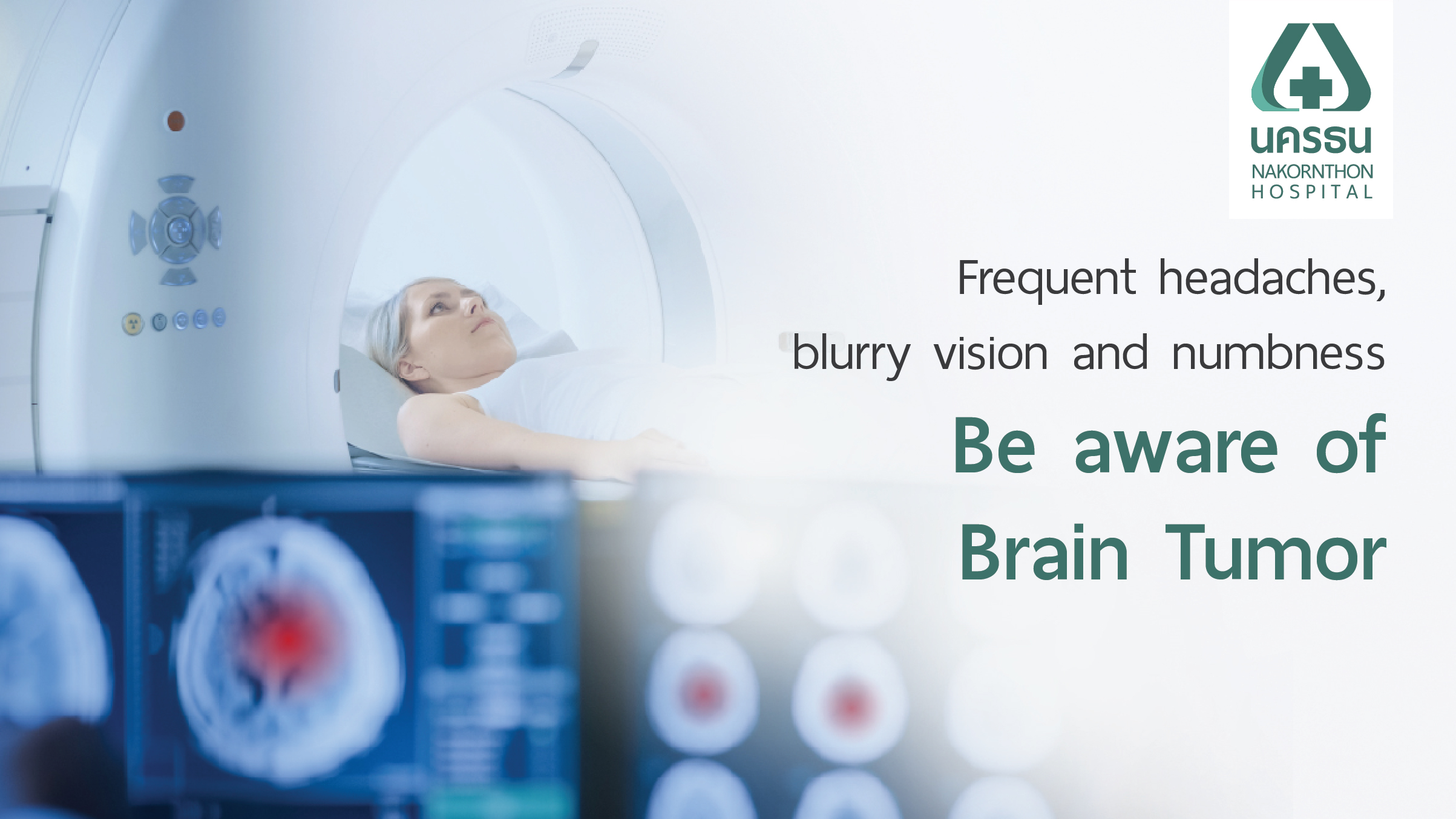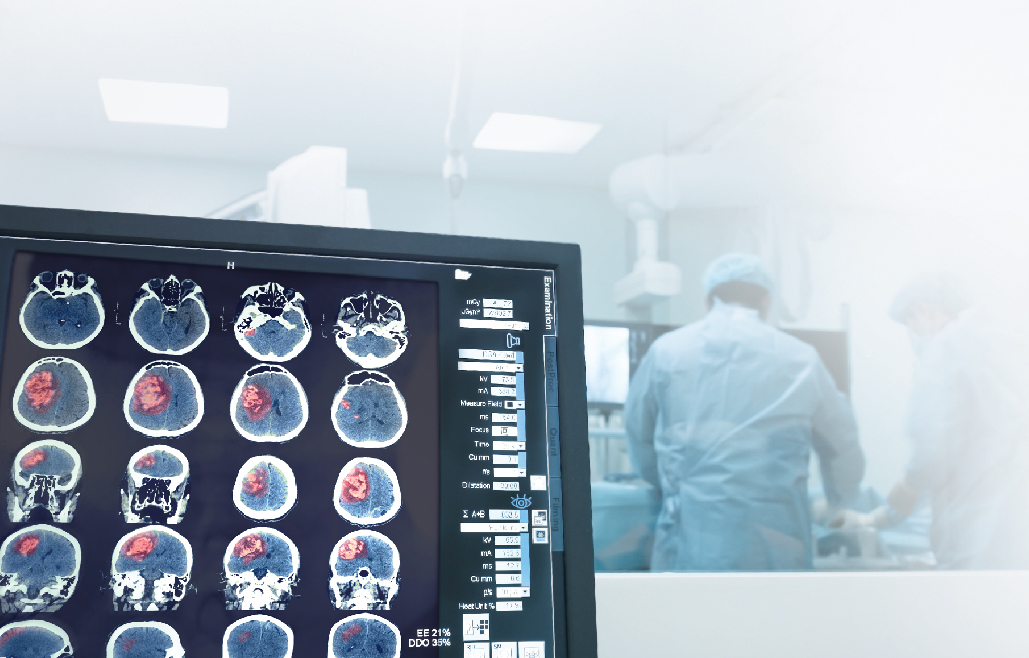Brain Tumor
Center : Neurology Center

Choose to read by topic:
What is brain tumors
Brain tumor are tumors arising from brain tissues, including tumors of cranial nerves, Meningeal tumor Pituitary gland tumor, Tumors in the skull base that have spread to the brain and cancer of other organs that have spread to the brain. At present, it is not known what causes this. However, there are some brain tumors whose cause is known, such as genetic factors. Those who received radiation therapy at the head area or have ever received sex hormones etc.
Types of brain tumors
Types of brain tumors can be divided into two main types:
- Benign Brain Tumors are benign tumors, has slow growth not cancer cells and can be cured. And there is a small chance that the patient will have it again after treatment.
- Malignant Brain Tumors are dangerous tumors. There is abnormal cell growth, namely cancer cells, which may occur in the brain area. Or cancer cells arise in other organs and spread to the brain, which will continue to grow uncontrollably and there is a chance that recurrence can happen even after treatment has been given. In general, cancerous tumors are more common than normal tumors.
In addition, brain tumors are often named according to the type of tumor cells, such as Gliomas, Meningeal tumors, Meningiomas, Acoustic Neuromas, Pituitary Adenomas and Craniopharyngiomas, PNETs - Primitive Neuroectodermal Tumors, Germ Cell Tumors, and Tumors brain in children (Medulloblastomas) which are mostly malignant tumors originating in the back of the brain and spreading through the cerebrospinal fluid. Often found in children but it can occur in adults as well.
Diagnosis
Diagnosis of brain tumors requires a computerized tomography scan (CT Brain) or magnetic resonance imaging (MRI Brain) to get a clear diagnosis. Such diagnostic tests are expensive and are not included in general health screening programs. You must see a doctor to determine if the patient is at risk of having a brain tumor and whether they needs to be examined with the said x-ray machine.
Brain Tumor Treatment
There are three main methods of treating brain tumors: surgery, radiation therapy, and medications. Sometimes it may take several treatments. How to combine them to get the best results.
Surgery
It is the main method of treatment for most brain tumors. If you are in a high-risk position that may affect nearby positions. It may just be aspiration to take out the tumor for diagnosis. Surgery to remove part of the tumor if it is in a position that can be surgically removed without harm to the patient. Doctors usually consider removing all or as much of the tumor as possible. Because the brain is an important and very sensitive organ. Therefore, we must rely on various equipment and technology to increase safety. Currently, surgery is performed using microneurosurgery, making it possible to see small spots deep in the brain. Navigation devices are being used to help make brain surgery more precise. Surgery is performed together with the use of magnetic resonance imaging equipment using an Intraoperative MRI to help locate and remove more tumors or having endoscopic surgery (Neuroendoscopic surgery) to help make the surgical wound small. Sometimes a brain tumor can be in a location that makes it dangerous for surgery, and surgery may be performed with the patient still conscious. So that the doctor can detect the location of brain activity during surgery (Awake craniotomy and brain mapping)
Radiation Therapy
Radiation Therapy: Doctors use high-energy radiation to kill cancerous brain tumors. Can be done by external irradiation method and radiotherapy (Brachytherapy) into the area close to the brain tumor.
Chemotherapy is the use of drugs to treat and kill tumor cells. There are both oral and intravenous drug forms. The doctor will prescribe medication as appropriate. Several forms of medication may be used together. Depends on symptoms The nature and severity of the tumor If the tumor is caused by cancer cells in other organs You must receive medication according to the type of cancer on a case-by-case basis.
Brain tumors that are common
1. Meningioma
It is an abnormality of the meninges inside the skull, Meningiomas are most common during adulthood and are more common in both genders. Most of these tumors occur for unknown reasons, but in some people, they may occur due to genetic diseases or have had it because they have undergone radiation therapy to their head, there can more than one meningioma can be found for some people.
The symptoms that appear depend on which part of the brain the tumor is affecting. For example, there may be seizures. Headache, vomiting, blurred vision, staggering, double vision, facial numbness, deafness, weak limbs, or others.
Treatment of Meningeal Tumors
The best standard method for treating meningiomas is surgery, by removing it completely. This can help cure of the disease. However, doctors may not always be able to completely remove the meningiomas, because tumors can sometimes grow around the brain's blood vessels or important nerves. This may could be risky and may result to the patient's death or disability if removed entirely. In cases where tumors cannot be removed completely, your doctor may recommend treating the remaining tumors with radiation. This will help prevent or delay the tumor from growing again.
Currently, there is technology for brain surgery using microsurgery. It is a surgery that has little effect on nearby tissue (minimally invasive neurosurgery) by using a high-magnification surgical camera, which provides high-resolution 3D images, helping the doctor to see the various parts clearly. Only abnormalities that reside deep in the brain and makes the surgery more accurate, safe, and has better results than conventional brain surgery.
2. Pituitary Adenoma
The pituitary gland is a small part of the brain located at the base of the skull above the nasal cavity. It is responsible for procuding various hormones such as growth stimulating hormone (growth hormone), sex hormones (FSH, LH), mammary gland stimulating hormone (Prolactin), adrenal stimulating hormone (ACTH), thyroid stimulating hormone (TSH), etc. The pituitary gland may be abnormal and become a tumor. This type of tumor can usually be found from adolescence to adulthood.
Symptoms of a Pituitary Tumor
Pituitary tumors can manifest in many different ways. It depends on what type of hormone the tumor produces.
- If the tumor produces hormones that stimulate the mammary glands (Prolactinoma)
- in women will have symptoms of missing menstruation. Milk may flow even though you are not breastfeeding.
- As for men, their sexual performance will decrease.
- If the tumor produces growth-stimulating hormones Adolescent patients will have abnormally tall bodies (Giantism). Adult patients will have unusually large bodies (Acromegaly), meaning large hands and feet. Abnormal facial shape, protruding forehead, large jaw, may also have high blood pressure or diabetes.
- If the tumor produces hormones that stimulate the adrenal glands (Cushing's disease), the patient will have a chubby face and body, acne, thin skin with cracks, thin bones, and decreased immunity to disease (Cushing's syndrome).
- If the tumor does not produce hormones, there will be no symptoms mentioned above. But it comes with symptoms of a lack of pituitary hormones. This is because the tumor will destroy the pituitary gland. This causes the pituitary gland to be unable to produce hormones (Hypopituitarism) patients will have symptoms of unusual fatigue. There may be nausea and vomiting dizziness, faint, drowsy, unable to stand the cold weather. Missed menstruation or decreased sexual performance, sometimes patients may have abnormal mineral salts in their body, causing lethargy or have seizures. When the pituitary tumor grows in size, the tumor presses on the optic nerve that is close to the pituitary gland, causing the patient to have blurred vision and an abnormally narrow visual field. Some patients come to the doctor because of bleeding in the tumor (Pituitary apoplexy), which causes the patient to have a headache and sudden blurred vision. There may be ptosis or decrease in level of consciousness.
Treatment of pituitary tumors
There are three types of treatment, depending on the type and size of the tumor: surgery, hormone blockers and radiation.
Surgery is the mainstay of treatment for most types of pituitary tumors. Currently, surgery is usually performed through the nasal cavity. This may be done using a microscope or using an endoscope if the tumor is not too large, it can usually be removed completely with surgery.
Antihormone therapy is an alternative treatment for certain pituitary tumors. Especially pituitary tumors that produce hormones that stimulate the mammary glands. (Prolactinoma), which patients may be able to take anti-hormone drugs. (Bromocriptine) instead of surgery.
3. Brain cancer that has spread from other organs (Metastatic tumors)
Cancer of various organs can spread to the brain, common cancers such as breast cancer, lung cancer, and colon cancer, prostate cancer. Can spread through the bloodstream leading to the brain. Most often it is found that the tumor has spread to more than one location in the brain.
Symptoms of brain cancer that has spread from other organs
Patients usually have a history of cancer. This is because the cancer that has spread to the brain grows quickly. Patients show abnormal symptoms over a relatively short period of time, such as several days or weeks. Patients may have headaches, seizures, weak arms and legs, numbness of arms and legs, abnormal communication, or staggering, etc. Some patients may have symptoms from cancer that has spread to the brain without ever knowing where the cancer came from.
Treatment of patients with cancer that has spread to the brain
- Brain radiation The doctor will irradiate the brain area to reduce the size of the tumor. When the cancer in the brain shrinks, symptoms will improve.
- Surgery is used in cases where there are no more than 5 brain tumors and symptoms arise from a large tumor or there is only one cancerous lump
- Immunotherapy drugs Can pass into the brain tissue and is used to treat and help prevent cancer from spreading to the brain. Commonly used to treat cases if lung cancer or breast cancer has spread to a small area of the brain
- Most chemotherapy drugs cannot enter the brain tissue. Because of a barrier called the Blood Brain Barrier, chemotherapy requires injections into the patient's spinal cord. It is usually used in cases where the cancer has spread to the meninges and cerebrospinal fluid.
It can be seen that brain tumors can be treated. But the results of treatment vary depending on the type, location, and size of the tumor. Important points that patients need to know after being diagnosed with a brain tumor are whether it is a good type of tumor or not, what causes it, and then the doctor will consider using appropriate treatment methods. Most importantly, patients must take care of their mental health and be strong, understand and follow the doctor's advice. It will help the treatment to be more effective.
Online Consultation
Article of Neurology Center





